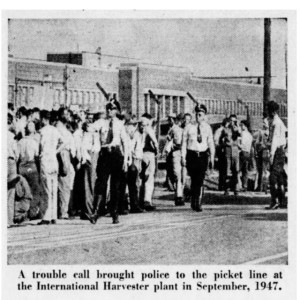
On this day in labor history, the year was 1947.
That was the day workers at the International Harvester plant in Louisville, Kentucky had had enough.
They had just rejected a pay scale lower than that of Harvester workers elsewhere.
In her recent article for Leo Weekly, historian Toni Gilpin refers to the lower pay as the “Southern Differential.”
Harvester workers walked off the job in a 40-day strike.
Black and white Louisville workers were united in a rare form of solidarity.
International Harvester had had a long labor-hating history.
Its forerunner had been the McCormick Reaper Works, the site that sparked the 1886 Haymarket incident in Chicago.
Harvester had been able to keep the unions out until the Farm Equipment Workers/CIO finally organized there in 1941.
And the FE followed Harvester as they attempted to escape to the union-free South.
The FE successfully organized the new Louisville plant, just two months before the strike.
Workers learned quickly that they were paid much less making the same equipment as their brothers in Chicago, Indianapolis and elsewhere.
Gilpin adds that FE literature forthrightly stated, “Once the Negro and white workers were united, the low-wage system of the South would collapse.”
Workers pressed for their demands, and appealed to area farmers for support.
They stressed that farmers would not pay less for equipment, simply because local workers were paid less.
Black and white workers picketed together, ate together and planned their strike together at their new union hall.
Harvester initially tried to redbait FE leaders.
When that failed, the company was forced to grant steep wage increases.
Gilpin cites FE News, which reported “two smashing victories in hand, one over International Harvester, the other over the Mason-Dixon, low-wage line.”
More Episodes
 2024-08-23
2024-08-23
 2024-08-23
2024-08-23
 2024-08-23
2024-08-23
 2024-08-20
2024-08-20
 2024-08-18
2024-08-18
 2024-08-17
2024-08-17
 2024-08-16
2024-08-16
 2024-08-15
2024-08-15
 2024-08-14
2024-08-14
 2024-08-11
2024-08-11
 2024-08-09
2024-08-09
 2024-08-07
2024-08-07
 2024-08-06
2024-08-06
Create your
podcast in
minutes
- Full-featured podcast site
- Unlimited storage and bandwidth
- Comprehensive podcast stats
- Distribute to Apple Podcasts, Spotify, and more
- Make money with your podcast
It is Free
- Privacy Policy
- Cookie Policy
- Terms of Use
- Consent Preferences
- Copyright © 2015-2024 Podbean.com




